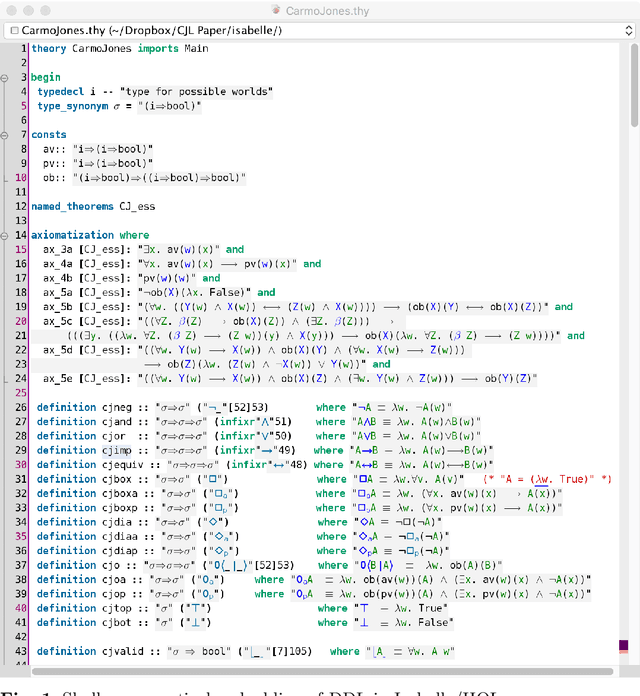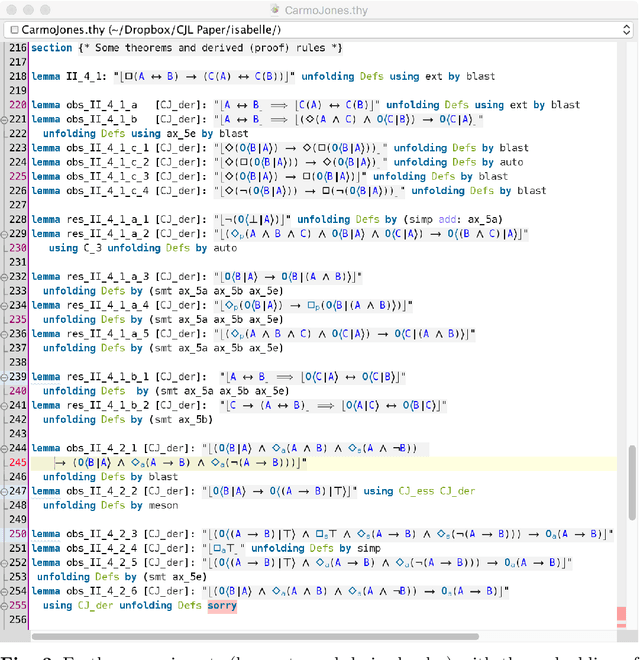Xavier Parent
Normative Conditional Reasoning as a Fragment of HOL
Aug 22, 2023



Abstract:We report some results regarding the mechanization of normative (preference-based) conditional reasoning. Our focus is on Aqvist's system E for conditional obligation (and its extensions). Our mechanization is achieved via a shallow semantical embedding in Isabelle/HOL. We consider two possible uses of the framework. The first one is as a tool for meta-reasoning about the considered logic. We employ it for the automated verification of deontic correspondences (broadly conceived) and related matters, analogous to what has been previously achieved for the modal logic cube. The second use is as a tool for assessing ethical arguments. We provide a computer encoding of a well-known paradox in population ethics, Parfit's repugnant conclusion. Whether the presented encoding increases or decreases the attractiveness and persuasiveness of the repugnant conclusion is a question we would like to pass on to philosophy and ethics.
Designing Normative Theories of Ethical Reasoning: Formal Framework, Methodology, and Tool Support
Mar 25, 2019



Abstract:The area of formal ethics is experiencing a shift from a unique or standard approach to normative reasoning, as exemplified by so-called standard deontic logic, to a variety of application-specific theories. However, the adequate handling of normative concepts such as obligation, permission, prohibition, and moral commitment is challenging, as illustrated by the notorious paradoxes of deontic logic. In this article we introduce an approach to design and evaluate theories of normative reasoning. In particular, we present a formal framework based on higher-order logic, a design methodology, and we discuss tool support. Moreover, we illustrate the approach using an example of an implementation, we demonstrate different ways of using it, and we discuss how the design of normative theories is now made accessible to non-specialist users and developers.
I/O Logic in HOL --- First Steps
Apr 19, 2018


Abstract:A semantical embedding of input/output logic in classical higher-order logic is presented. This embedding enables the mechanisation and automation of reasoning tasks in input/output logic with off-the-shelf higher-order theorem provers and proof assistants. The key idea for the solution presented here results from the analysis of an inaccurate previous embedding attempt, which we will discuss as well.
First Experiments with a Flexible Infrastructure for Normative Reasoning
Apr 09, 2018



Abstract:A flexible infrastructure for normative reasoning is outlined. A small-scale demonstrator version of the envisioned system has been implemented in the proof assistant Isabelle/HOL by utilising the first authors universal logical reasoning approach based on shallow semantical embeddings in meta-logic HOL. The need for such a flexible reasoning infrastructure is motivated and illustrated with a contrary-to-duty example scenario selected from the General Data Protection Regulation.
Faithful Semantical Embedding of a Dyadic Deontic Logic in HOL
Mar 05, 2018


Abstract:A shallow semantical embedding of a dyadic deontic logic by Carmo and Jones in classical higher-order logic is presented. This embedding is proven sound and complete, that is, faithful. The work presented here provides the theoretical foundation for the implementation and automation of dyadic deontic logic within off-the-shelf higher-order theorem provers and proof assistants.
 Add to Chrome
Add to Chrome Add to Firefox
Add to Firefox Add to Edge
Add to Edge